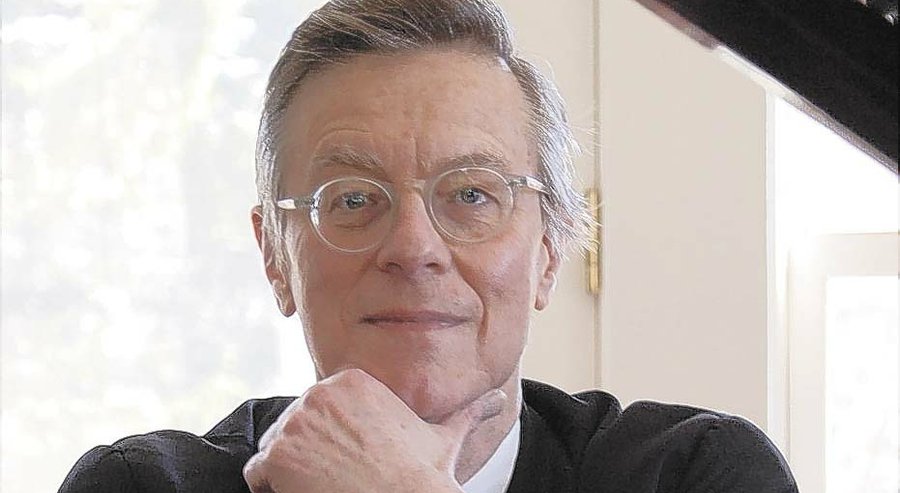Serkin’s stellar playing makes the strongest case for Reger in mixed ASO program

Peter Serkin performed Max Reger’s Piano Concerto with the American Symphony Orchestra Thursday night.
Under longtime music director Leon Botstein the American Symphony Orchestra has built a practice around the rediscovery of obscure and/or challenging works and composers — to the point where each new season commands immediate interest for Botstein’s unorthodox choices.
But as has been widely noted, there is tension between Botstein’s great scholastic imagination and his range as a conductor. On Thursday night at Carnegie Hall, with Botstein leading the ASO in a program dedicated to a transitional German composer, Max Reger, that gap between reach and grasp sometimes showed.
Nor is it clear that “Giant in the Shadows,” as the program was titled, made its stated case for Reger (1873-1916) as a kind of hidden but essential force — a great, almost gravitational unifier of German classical music from Brahms to Berg.
Reger’s aptitude for both old-world polyphony and more contemporary chromatic music were audible in the two works chosen by Botstein: the densely plotted Piano Concerto in F Minor (1910) and the more approachable Variations and Fugue on a Theme of J.A. Hiller (1907), after the obscure 18th Century comaptriot.
But portraying Reger, who died at age 43, as “the crucial missing link,” to quote Botstein’s program notes, felt like more scholarship than an evening of Reger could or needed to bear, even when joined smartly with Three Études for Orchestra (1940) by violinist Adolf Busch, a contemporary of Reger who outlived him and advocated for his work.
The Busch Études are essentially a symphony about symphonies, consisting of three movements exploring the compositional and performance-related hurdles for which they are named — one movement each “For Intonation,” “For Precision” and “For Change of Tempo and Meter,” in that order.
It was an interesting opener, needless to say, considering the knock on Botstein as a conductor of large-scale pieces. Some errant pitch in the first swell of woodwinds right near the outset — although not the conductor’s fault — seemed to inadvertently confirm the challenges posed by group intonation.
There were no obvious stumbles afterward, and the Busch symphony proved an agreeable survey of classical method, with pretty pastorales giving way to crisp waltzes and to a grand panorama that also demonstrated a considerable American influence on Busch.
A celebrated musician who left Germany out of disgust with the Nazi party, Busch eventually settled in the United States, and it was impossible not to hear in the last movement of his Études a Gershwin-like evocation of American industry and bustle.
Even so, Botstein oversaw some labored stretches in the Études that foreshadowed a similar bogging down in portions of the Reger concerto. The soloist, Peter Serkin, however was stellar throughout and played thrillingly in what was also a poetic continuation of his late father’s work. Rudolf Serkin took on Reger’s F minor concerto for a 1959 recording with conductor Eugene Ormandy and the Philadelphia Orchestra. Reger, a keyboardist himself, knew how to deploy a pianist to exhilarating effect for large forces.
But in the long, opening Allegro moderato the younger Serkin was occasionally swamped by a hash of orchestration, and by Botstein conjuring up more volume than verve from his players. Counterpointed exchanges of ascending and descending figures between pianist and orchestra sometimes felt like exercises more than statements.
The performance recovered nicely in the Largo, where Serkin forged an absorbing, Brahms-like solitude and Botstein proved very capable of eliciting a quieter and less populated kind of impressionistic feeling for the music.
The final Allegretto was more of a mixed bag, opening at a confident, regal clip, and with pianist Serkin in fiery, elemental form. Serkin’s nimble ability to tease out the heavy, chromatic knottiness in Reger’s music, at any tempo, wasn’t always matched by Botstein and the orchestra. The ending of the concerto was greeted with relief as much as admiration.
Things went better with Reger’s Hiller-inspired Variations — a more textbook example of composition, requiring fewer acrobatics and visionary leaps of imagination from the conductor. Containing glimpses of Wagnerian clamor and Straussian beauty, and closing with an elegantly terraced fugue, this was the usually heavy-hearted Reger at his most affable — counterpointing not just notes but eras — and Botstein drew the finest and most polished playing of the evening at his populist, engaging best as advocate.






